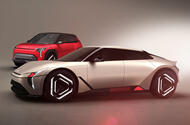Stinger GT’s successor would likely use the E-GMP platform
‘EV1’ and 600bhp+ performance model could be next in brand’s electric expansion
Kia is planning to bookend its range of EVs, with an entry-level city car and a new halo model under consideration.
The Korean brand has trademarked names from EV1 to EV9 for a range of models, and while it has confirmed that an EV2 will sit below the new EV3, the prospect of an EV1 has been off the table until now.
But Kia president Ho-sung Song confirmed to Autocar on a Car of the Year test drive of the new EV3 that an electric city car to replace the Picanto in the longer term was the “next, next target” as Kia seeks to bring down the cost of EV technology.
Such a car would need to cost below €20,000 (roughly £16,850) and would not be possible before the end of the decade. Until then, Kia is working to lower the cost of electric cars in €5000 increments: the EV3 is €35,000 (£29,500) in Europe and the 2026 EV2, a new supermini-sized model, will be below €30,000 (£25,285).
In time, the cost of those models could drop as battery technology becomes more affordable, at which point the possibility of a sub-€20,000 city car becomes viable.
Song said targeting the €15,000-€20,000 city car segment was “very difficult, very challenging” for any car maker regardless of the powertrain – and making it electric only made it harder.
“Our next target is an EV model starting from €30,000,” he said. “This is what we’re preparing to offer customers. Still, we think we need sub-€25,000 (sub-£21,070) in our EV cars and maybe we can leverage around €20,000. But that cannot happen in the next two years.”
At the other end of the range, Song said a brand-building model like the previous Stinger GT but with an electric powertrain was under consideration to offer a similar halo effect to the company’s line-up.
“That kind of model is under study,” he said. “What kind of model can help build the brand? This is what we are now studying.”
The versatility of electric skateboard structures such as the E-GMP architecture used to underpin the likes of the EV6 and EV9 make such a car more viable in the electric era due to the greater commonality of components with other models in the range. As such, all-wheel drive from a dual-motor layout and more than 600bhp would be possible for such a flagship.
More generally, Song said that while demand for electric cars in Europe outwardly appears “sluggish”, the general trend is that Europe is “getting stronger” and he “does not worry long term” about EV uptake.
Song said incentives are still needed to boost demand in the short term and the recent volatility was a product of incentives being removed in countries such as Germany.
“In the meantime, most OEMs are trying our best to reduce the cost of EVs to provide a better price to our customers,” he said.
While development investments in hybrid models have recently increased at Kia, Song said the majority of investments are in electric cars and this remains the direction of travel for the company.
He also confirmed that solid-state batteries remain under development at Kia and the outlook for the technology is “in every aspect quite better” than today’s alternatives, although no date has been put on its showroom arrival.







